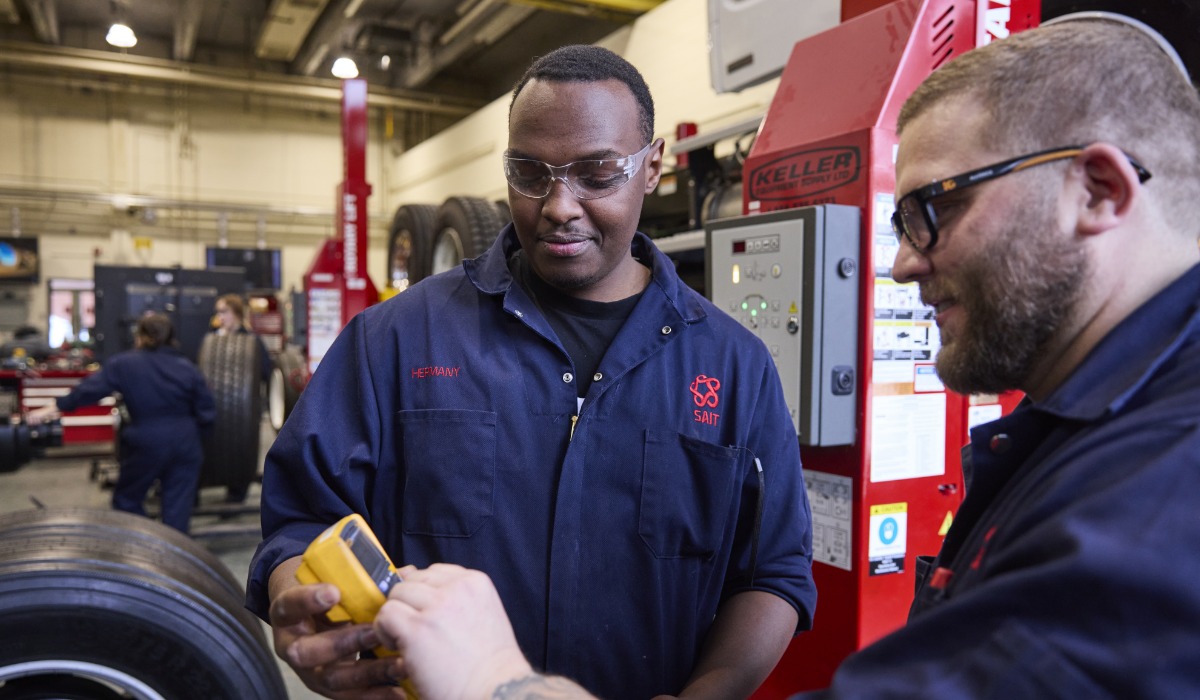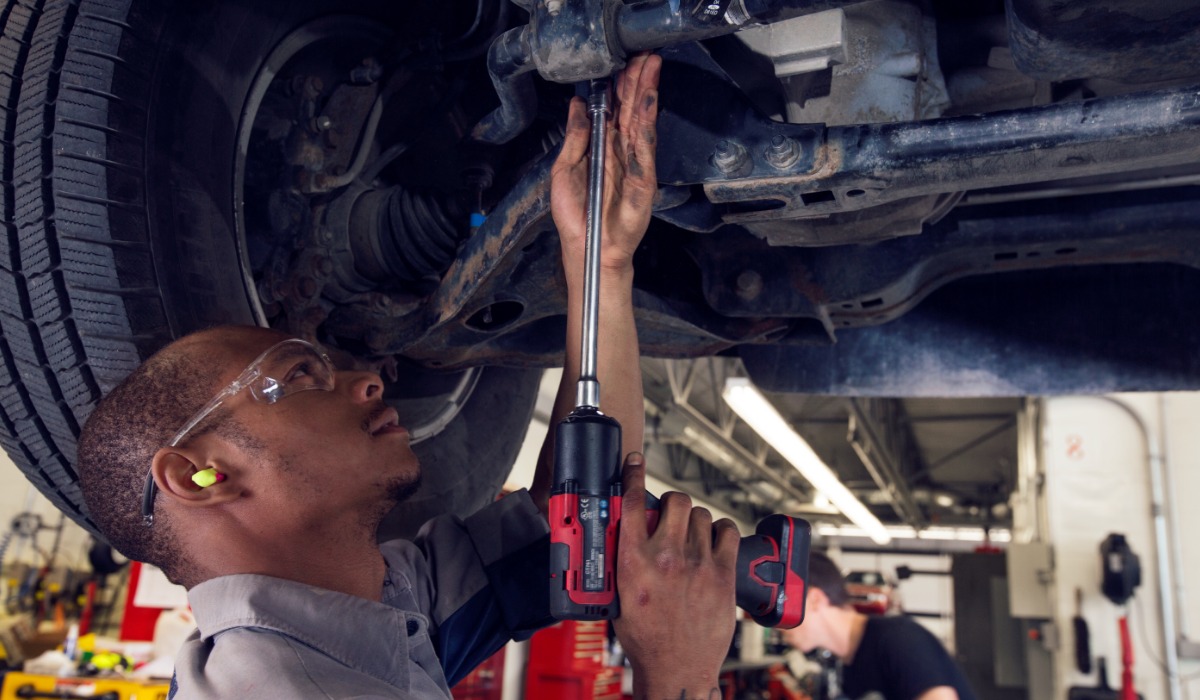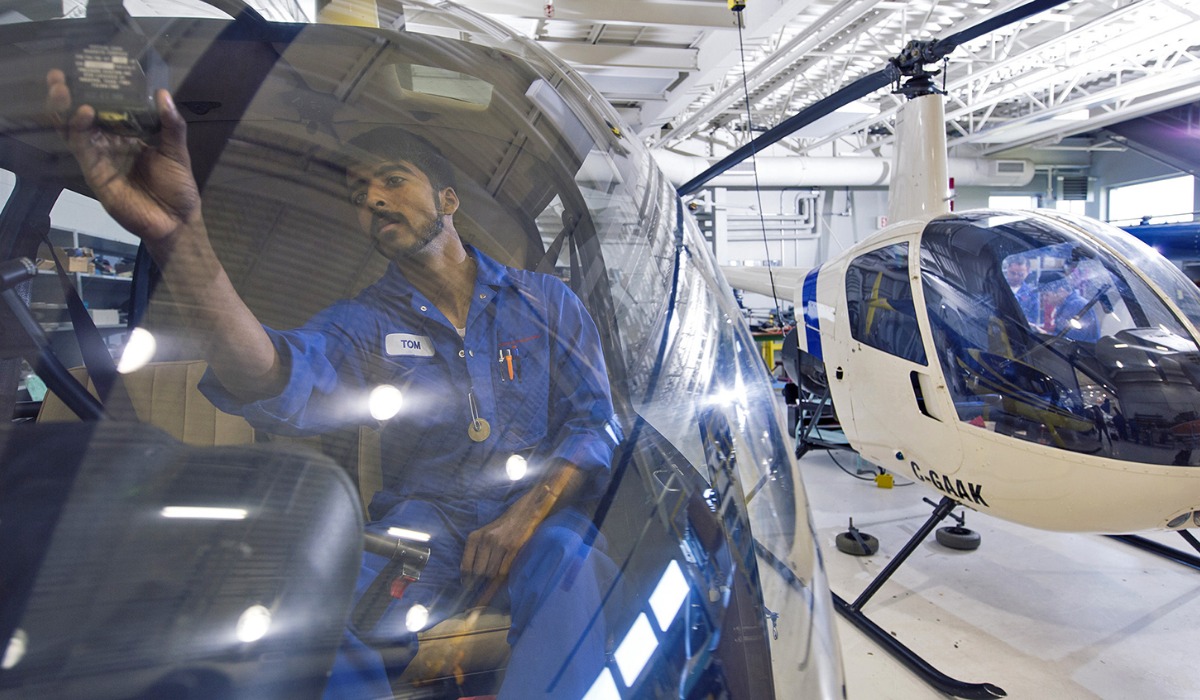Overview
Our Transport and Heavy Equipment Technology program offers comprehensive training for those looking to enter the fields of transport and heavy equipment maintenance and repair.
With a focus on real-world skills, the program combines classroom learning, online courses and hands-on shop experience to provide you with the necessary expertise in diagnosing, installing, maintaining and repairing various types of transport vehicles and off-road heavy equipment.
In this program, you will:
- engage with modern equipment and diagnostic tools through practical exercises and hands-on training
- gain knowledge in mechanical, electrical and hydraulic systems, among others
- develop the soft skills in communication and business training needed for career advancement
- get real-world experience and apprenticeship training between the second and third semesters with an optional work-integrated learning component.
As a graduate, you will be equipped for work in various sectors, including light and heavy construction, oil field support, forestry, mining, marine, transportation, public utilities and agriculture.
If you'd like to progress into an apprenticeship and earn your journeyperson designation, our advisors can assist with career planning.
Tailor your education with part-time, full-time and online learning options.
Benefit from the program's strong ties with industry leaders for potential employment opportunities.
The program is designed to be responsive, ensuring that graduates are job-ready and equipped with the knowledge and skills that reflect industry standards and are in high demand.
Those in transport and heavy equipment technology tend to be objective, methodical and innovative.
You need:
- good vision, hearing and sense of smell to diagnose problems
- strength and stamina for working with heavy equipment in cramped or awkward positions
- mechanical ability
- the ability to work alone or as part of a team
- the ability to think logically
- an interest in all types of machinery and engines, electronics and precision equipment.
You should enjoy doing precision work, solving problems and working with your hands.
This program aligns with Alberta Apprenticeship and Industry Training (AIT) curriculum for Heavy Equipment Technicians periods one through four.
Graduates are eligible to challenge the technical training exams.
Upon passing, you can register as an apprentice and complete the on-the-job training hours to earn your journeyperson designation.
You can complete a voluntary, 15-week work term between your second and third semesters, where you can work in industry and become registered as an apprentice.
After successfully completing this program, you'll be awarded a SAIT Transport and Heavy Equipment Technology diploma.
Careers and opportunities
Our graduates may work in the following occupations. Some careers require additional experience and education.
Associated National Occupational Classification (NOC) codes: 72020, 72410, 72411, 72422, 72603, 74201, 74203.
Career planning support
Unsure which career path is for you? Here are some recommended career planning resources to help you decide your future.
You can also head to Alberta alis for lots of information about careers in Alberta, including quizzes and labour market information to help you narrow down a path.
Finally, you can take our online career finder quiz, which can help narrow your options based on your current skills and interests.
Courses
The Transport and Heavy Equipment diploma requires 60 credits (19 courses) to complete.
The program spans two years, with two to three semesters in year one (depending on if you choose to complete the optional work term) and two semesters in the second year.
| Course | Credits |
|---|---|
|
Learners will gain an understanding of the strategies and skills required for effective communication in a professional environment. Topics include active listening, conflict resolution, writing industry specific reports and documents, developing interview skills, and giving and receiving feedback. |
1.5 |
|
This course introduces you to the fundamentals of the hydraulic systems found in heavy machinery. You will learn how to assemble basic hydraulic circuits based on hydraulic principles, and you'll examine hydraulic system components and their operations. You will also get hands-on experience rebuilding hydraulic system components and applying the theory you have learned in a lab setting. |
3 |
|
This course explores the principles of brake system operation. You will examine the operating principles and service procedures of hydraulic brake system components, power braking systems and parking brake systems, as well as the operation of air brake mechanical and system components. You'll also get hands-on practice inspecting and repairing hydraulic, pneumatic and electronically-controlled and operated brake systems. |
3 |
|
This course introduces you to key topics in the theory and operation of electrical and electronic systems. You will examine how to calculate circuit values, explore the principles and theory of magnetism, and use electrical test equipment to measure electrical values and check circuit operation. You'll also service, test and charge batteries, and repair wiring harnesses, lighting circuits and circuit protection devices. The course concludes with an examination of the use and operation of electronic components and electronic control systems. |
3 |
|
This course covers the key areas you need to know to work safely and effectively. You will examine the legislation, regulations and practices that help to ensure a safe workplace, as well as the use of personal protective equipment (PPE) and safe practices for climbing, lifting, rigging and hoisting. You'll also explore safety practices for hazardous materials and fire protection in this trade. This course also includes the correct use of common hand, shop and power tools, and you'll perform basic trade calculations and accurate measurements. The course concludes with an examination of oxyfuel heating and cutting, and SMAW welding operations. |
3 |
|
In this course, you will examine the operating principles, design features and repair procedures of common frame and suspension systems, and you will service common bearings, seals, wheels, tires and hubs. You'll also explore common trailer configurations and components, and you will service trailer coupling systems and landing gear. The course also covers trailer inspections and the benefits of maintenance systems used with off-road and on-road equipment. |
3 |
|
In this course, you will gain a theoretical and practical understanding of the operating principles of various cranking and charging systems used in the heavy equipment trade. The material and coursework provide opportunities to diagnose, service and repair cranking and starting systems, both off-equipment and on-equipment. In addition, the content covers different charging components and alternative cranking systems found in today's vehicles and equipment. Pre-requisites:
|
1.5 |
|
This course introduces you to mechanical fuel injection systems. Topics include diesel fuel properties and correct storage, combustion process and starting aids, basic mechanical fuel supply and transfer systems and high-pressure hydraulic fuel injection systems. You will have the opportunity to perform fuel system testing and diagnosis. Throughout the course, you will apply the theories in a shop setting to get hands-on experience. Pre-requisites:
|
1.5 |
|
In this course, you will expand on the material covered in other courses to include computer-controlled and electronically controlled fuel injection systems in current vehicle and equipment models. Topics include electronic system fundamentals, various electronically controlled fuel injection systems, troubleshooting, diagnostics, and common service and repair practices. The material also covers present-day emission control systems and the history of emissions controls. Additionally, you will discuss repair procedures for alternate fuel systems and engine braking systems. To put theory into practice, you will have opportunities to demonstrate diagnosis, service and repairs in a lab setting. Pre-requisites:
|
3 |
|
This course provides an in-depth exploration of heavy equipment engine fundamentals, combining theory in class and application in a shop setting. Topics include the components and operating of an internal combustion engine, design and function of engine components, as well as understanding timing and the interconnected nature of the engine. Students will have ample opportunities to perform basic service and repairs on different engine components. Pre-requisites:
|
6 |
|
In this course, students will further their understanding of engine systems through theory and practice. The material covers the principles and functions of air, lubrication, cooling and exhaust systems used in today's internal combustion engines. Learners will perform diagnostics, service, and repair of the systems and apply the theory in a shop setting. Pre-requisites:
|
1.5 |
|
Learners will gain an in-depth understanding of open and closed center systems along with hydrostatic closed loop and constant horsepower systems used in current machinery. Hydraulic components, system operations, diagnostics, schematic reading, servicing, and repairing will be covered along with mechanical, pilot operated and electro-hydraulic control systems. Opportunities will be provided in a lab setting to apply the theory of electronic controls and perform diagnostics, servicing, and repairing of components and circuits. Pre-requisites:
|
6.0 |
|
Learners will gain an in-depth understanding of torque converters, both planetary and countershaft powershift transmissions, differentials axle carrier assemblies, automated drive machines, A/C drive systems, and final drives. Constant velocity transmissions as well as other emerging off-road powertrain systems and the principles related to geared components will also be introduced. Opportunities will be provided for learners to gain experience in servicing and repairing various powertrain components in a lab setting. Pre-requisites:Concurrent Prerequisite
|
6 |
|
Learners will gain an understanding of full-time power steering systems, walking beam suspension and hydro-pneumatic suspension systems. Topics will also include electronic monitoring system integration. Opportunities will be provided for learners to perform diagnostic, repairing and servicing in a lab setting. Pre-requisites:
Concurrent Prerequisite
|
3 |
|
Learners will review the scientific principles and operation of air conditioning systems in on-highway and mobile equipment. Opportunities will be provided in a lab setting to diagnose, service and repair common air conditioning systems and follow industry safety standards and environmental requirements. |
3 |
|
In this course, you'll explore how the heavy equipment industry uses key auxiliary systems, including GPS, GIS, autonomous vehicles, electric vehicles and hydrogen-based fuel systems. You'll also examine how emerging technologies could impact each of these systems and discuss their potential for the industry. |
1.5 |
|
Learners will gain an in-depth understanding of mechanical and automated countershaft transmissions, axle assemblies, differentials, clutches, driveline, and transfer case operating principles, diagnostics, service, and repair. Opportunities will be provided to apply theory in a lab setting. |
6 |
|
Learners will build on their foundational knowledge about braking systems and will be provided with a practical understanding of steering angles, alignment, inspection, and service of on-highway vehicles. Anti-lock braking systems are also covered, and opportunities are provided in a lab setting to perform diagnostics, service, and repair to on highway vehicles brake systems. Pre-requisites:
|
3 |
|
Learners will build on their understanding of frame and suspension systems as well as gearing and wheel systems and apply this knowledge to trailer systems used in the on-highway transport industry. Topics will also include structures, accessories, and efficiency systems. Opportunities will be provided to apply theory in a lab setting. Pre-requisites:
|
1.5 |
| Course | Credits |
|---|---|
|
The cooperative work term course offers students an optional opportunity to augment their classroom learning by applying theoretical knowledge and gaining practical experience in a professional workplace setting. This course serves as a bridge between academic studies and real-world industry practices, enabling students to develop valuable skills, enhance their employability, and establish connections within industry. |
0 |
Progression
You must attain a PGPA and/or a CGPA of 2.0 or better each semester and pass the prerequisite courses to progress through the program.
To qualify for graduation, you must pass all courses, attain a CGPA of 2.0 or better and complete course requirements within the prescribed timelines.
Admission requirements
Applicants educated in Canada
Applicants must demonstrate English language proficiency and completion of the following courses or equivalents:
- at least 50% in Math 20-1 or Math 20-2 or 60% in Math 20-3, and
- at least 50% in English Language Arts 30-1 or English Language Arts 30-2 , and
- at least 50% in one Grade 11 Science.
If you have graduated from SAIT's Diesel Equipment Technician certificate within the last five years, you may be given advanced standing into year two of the program, depending on seat availability.
SAIT accepts high school course equivalents for admission for applicants educated outside of Alberta.
All applicants who were educated outside of Canada must demonstrate English language proficiency and provide proof they meet the program admission requirements outlined above with an international document assessment. Find accepted educational documents and assessment options.
SAIT may also accept courses completed at certain international post-secondary institutions.
Academic Upgrading
Missing an admission requirement for this program? Upgrade your prior education to help you receive admission into one of SAIT's career programs.
English language proficiency
All applicants must demonstrate English language proficiency prior to admission, including students educated in Canada.
Transfer agreements
At SAIT, we have created transfer agreements with partner institutions to allow you to earn course credits toward your SAIT program based on your previously completed credentials.
Transfer Alberta search tool
Use the Transfer Alberta search tool to see all transfer agreements between Alberta post-secondary institutions (including those with the University of Calgary, Mount Royal University and Bow Valley College.)
Search transfer agreements in Alberta
Transfer options for graduates
When you have completed this program, you may continue your education at a partner post-secondary institution. These transfer agreements include partnerships within and/or outside of Canada.
Available intakes
Winter 2026
Start dates:
- Domestic students: Closed
-
-
Application deadline:
-
- International students: Closed
-
-
Application deadline:
-
Spring 2026
Start dates:
- Domestic students: Open
-
-
Application deadline: April 30, 2026
-
Fall 2026
Start dates:
- Domestic students: Waitlisted
-
-
Application deadline: June 30, 2026
-
- International students: Open
-
-
Application deadline: May 29, 2026
-
Winter 2027
Start dates:
- Domestic Students (apps open March 4, 2026): Closed
-
-
Application deadline: Oct. 23, 2026
-
- International students: Open
-
-
Application deadline: Oct. 9, 2026
-
Costs
2025/26 tuition and fees
The following estimated costs are effective as of July 1, 2025.
The estimated total cost of tuition and fees is based on the suggested schedule of study. Following a modified schedule will impact the fees you pay per semester and may alter final costs.
Domestic students
The program total is based on the estimated amount you will pay if you enter this program during the 2025/26 academic year. The program total amount listed on your letter of admission may appear higher. This amount is your maximum tuition guarantee for the program. SAIT will not exceed this maximum, regardless of changes in tuition and fees between academic years.
Books and supplies are approximately $2,000 per full-time year.
This is a bring-your-own-device program with a standard computer hardware and software requirement. See the specific requirements on our computers and laptops page.
Find your booklist on the SAIT Bookstore's website. The booklist will be available closer to the program start date. Can't find your program or course? The bookstore didn't receive a textbook list. Contact your program directly to determine if they're still refining course details or if you're in luck; no textbook purchase is required this term.
Financial aid
Paying for your education may feel overwhelming, but we have resources and programs that can help, including information about payment options, student loans, grants and scholarships.
Application process
Ready to apply?
Follow our step-by-step guide to submitting a successful application.
Communication during admission
Email is the primary source of communication during the selection process. Ensure your personal email account is managed appropriately to receive our emails, files and communications. We recommend you add the transportation.info@sait.ca domain to your safe senders list or you risk missing critical email messages.
Begin your application
Apply now using the online application portal.
Ensure you have a valid Visa or Mastercard to pay the non-refundable application fee of $120 for domestic applicants or $175 for international applicants.
Information sessions
Prepare for a strong start in your chosen program or get the details you need to decide your future path.
Our expert staff and faculty are ready to answer your questions and provide information about the following:
- What sets SAIT apart
- An introduction to the program and area of study
- Admission requirements
- Future career paths
- Information on the earning potential and graduate employment rates.
Contact us
School of Transportation Advising
-
Phone - 403.284.8471
International Student Advising
-
Phone - 403.284.8852
-
Email - international@sait.ca
Subscribe for updates
Your journey starts here! Sign up to get important updates on:
- Transportation and logistics programs
- Application information
- Relevant news and events

Oki, Âba wathtech, Danit'ada, Tawnshi, Hello.
SAIT is located on the traditional territories of the Niitsitapi (Blackfoot) and the people of Treaty 7 which includes the Siksika, the Piikani, the Kainai, the Tsuut’ina and the Îyârhe Nakoda of Bearspaw, Chiniki and Goodstoney.
We are situated in an area the Blackfoot tribes traditionally called Moh’kinsstis, where the Bow River meets the Elbow River. We now call it the city of Calgary, which is also home to the Métis Nation of Alberta.




